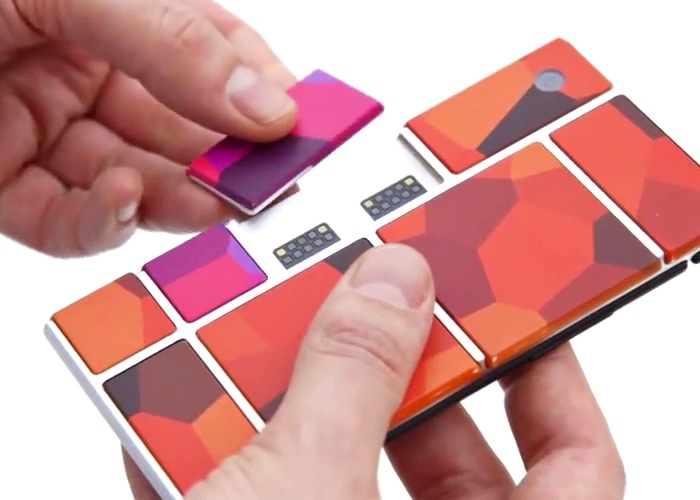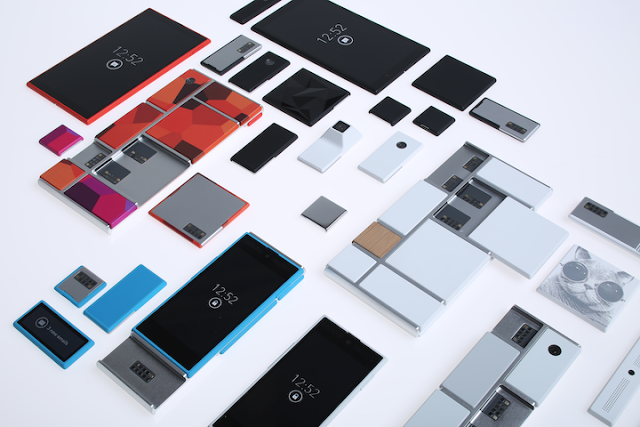Project Ara Gains Support For Nvidia Tegra K1 And 64-Bit Marvell Chip Modules
The Project Ara modular phone platform is close to being launched, and Google seems to already have a few modules ready to go. Two of the latest modules supported by the Ara platform include a module that contains the Tegra K1 processor, and another that contains a Marvell PXA1928 processor (quad-core 64-bit Cortex A53).
It seems Google is creating two reference designs that will sell at different price points and will also have different form factors. It's likely the Tegra K1-based reference platform will be the most expensive and also have the largest size, while the Marvell-based one will have the smaller size and lower-priced module.
The Tegra K1 chip is probably going to be the Denver-based version, because then both chips would be based on the ARMv8 architecture. That should make things a little easier for Ara developers, as they won't have to make the modules compatible with two different instruction sets.
Both modules are part of the Spiral 2 series of prototypes, which will be shown at the Ara developer conferences held in Mountain View and Singapore on January 14 and January 21, respectively.
There's another Rockchip-based module in the works that's more integrated with the platform, and it will be compatible with the Spiral 3 prototypes that should be unveiled this coming spring. The Spiral 3 series of prototypes may be the last ones before the final product appears, but that's not certain yet.
Project Ara is likely to be the first modular phone platform to come to market next year, but competitors such as Puzzlephone and Vsenn promise not to be too far behind. Each takes a different approach to modularity, so it will be interesting to see which of them the market will choose.
Simplicity (a strength of the Puzzlephone and Vsenn) usually wins, but Google, the company behind Android that already has an inherent advantage with partners such as Nvidia, Marvell, Rochip and Toshiba, also has a head start in terms of awareness. At the developer conferences next month, Google intends to unveil the module marketplace, which should give Ara yet another advantage over the competition.
Get Tom's Hardware's best news and in-depth reviews, straight to your inbox.
Follow us @tomshardware, on Facebook and on Google+.
Lucian Armasu is a Contributing Writer for Tom's Hardware US. He covers software news and the issues surrounding privacy and security.
-
epaciga Awesome-sauce! Modular makes a ton of sense when it comes to smartphones; if anyone can pull it off it would be Google, Apple, or Samsung - I'm just glad someone's getting the ball rolling so the rest can catch up with competition.Reply
-
Haravikk I'm really interested in this project, as it could very well be what I aim for with my next phone, probably aiming for lower-end capabilities with a view to upgrading, which I think could be great.Reply
However, every time I see that exploded view with all the modules separated, I just can't help but think that's what will happen if I drop it… -
clifftam "Project Ara is likely to be the first modular phone platform to come to market next year, but competitors such as Puzzlephone and Vsenn promise not to be too far behind."Reply
One of the reasons for modular phone platform is that it will help reduce the wastage of throwing the phone away. With various modular platforms popping up, wouldn't that create just as much wastage?
-
amk-aka-Phantom Replyif anyone can pull it off it would be Google, Apple, or Samsung
... yeah RIGHT, Apple. Because *they* are so famous for letting the users choose...
With various modular platforms popping up, wouldn't that create just as much wastage?
Of course not. Do you seriously think that these "competitors" will actually succeed?
I just can't help but think that's what will happen if I drop it…
There's no reason why all this modular gooodness couldn't be protected by a robust case. Otherwise... I guess... you assemble it all back together? :D Worst case scenario, your screen cracks, like with any modern smartphone. Oh wait, you can now replace it yourself, probably for much cheaper, too. -
ericburnby I still predict this will go nowhere.Reply
To have modules requires a standardized bus system and the one selected for Project Ara isn't fast enough to support the most powerful devices currently used in smartphones. And it adds complexity. Many current components are able to directly connect to an SoC - now they'll need to add a bus connection where none previously existed.
Further, many components are directly tied to the capabilities of your SoC. For example, you won't be adding a high MP or 4K camera to last years phone since the SoC can't process the data from the sensor fast enough. So you're going to have to upgrade the processor AND the camera.
Then you have SoC's from companies like Qualcomm with integrated LTE vs SoC's that require an external cellular modem. What happens when your existing phone with its own LTE modem gets the latest Qualcomm processor with a built-in modem? Which one gets used? Does the Qualcomm SoC know enough to disable its own and connect to the external modem via the bus.
What about drivers? Is your mobile OS suddenly going to gain Plug n Play (remember how this worked on Windows when it first came out)? How much bloat will this add to an OS designed to work on a device with limited resources? And who's going to be responsible when a conflict arises?
While the idea of making phones like your PC where you pick the CPU, storage, memory, GPU and other peripherals sounds good on paper, in reality it's going to be riddled with problems. -
eriko I SO want this to succeed.Reply
And I have faith in them, as the engineers are ex-DARPA, whom have made some of the coolest tech in history.
Backed with Google's money & resources, what is there to hate kiddies? -
RunLuke I don't get this and never have.Reply
More brittle, larger components, fatter phone, more expensive in the long run, compatibility issues hard- and softwarewise, availability of modules, the exact opposite of what people buy into when choosing a phone. Good idea, but IMO not practical at all. -
Mac266 The main problem with Project Ara that I saw was going to be the lack of partners. But with Nvidia and Marvell onboard I think others will be soon to follow.Reply -
urmamasllama well there is one of the things i wanted for ara now i just need an amoled display (don't care who makes it) and sprint band cdma modem and im setReply

